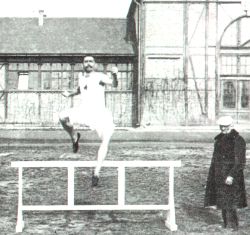Contents
- Background
- Competition format
- Records
- Schedule
- Results
- Semifinals
- Final
- Results summary
- References
- Notes
| Men's 110 metres hurdles at the Games of the I Olympiad | |||||||
|---|---|---|---|---|---|---|---|
 Alajos Szokolyi hurdling | |||||||
| Venue | Panathinaiko Stadium | ||||||
| Dates | April 7, 1896 (heats) April 10, 1896 (final) | ||||||
| Competitors | 8 from 6 nations | ||||||
| Winning time | 17.6 OR | ||||||
| Medalists | |||||||
| |||||||
| Athletics at the 1896 Summer Olympics | |
|---|---|
| | |
| Track events | |
| 100 m | men |
| 400 m | men |
| 800 m | men |
| 1500 m | men |
| 110 m hurdles | men |
| Road events | |
| Marathon | men |
| Field events | |
| Long jump | men |
| Triple jump | men |
| High jump | men |
| Pole vault | men |
| Shot put | men |
| Discus throw | men |
The men's 110 metres hurdles was the only hurdling event on the Athletics at the 1896 Summer Olympics programme. The preliminary heats served as the inaugural track event of the day on 7 April. Eight competitors participated in two heats, each comprising four runners. Only the top two runners from each heat progressed to the final. [1] The event was won by Thomas Curtis, representing the United States.